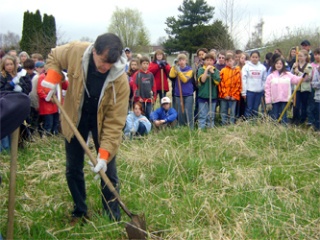MARYSVILLE — Marysville students teamed up April 10 with members of Project SeaWolf Coastal Protection, the Sierra Club and Coastal Keys Realty, among others, to plant 1,500 native fir, cedar and dogwood trees at Jones Creek, an 11-acre parcel of wetland in the watershed of the Allen and Quil Ceda creeks.
Approximately 100 fourth- and fifth-grade students from the Marysville Cooperative Education Program at Quil Ceda Elementary School performed the planting at Jones Creek, just south of the Glennwood Mobile Estates, off Fourth Street NE, and across the road from the Marysville YMCA and Allen Creek Elementary School, in honor of Earth Day. Co-op teachers Hank Palmer, Sue Johnston and Jeri Novy have partnered with the Marysville-based environmental group, Project SeaWolf, for three years on annual tree-planting projects.
“It’s been a valuable part of our science and environmental studies curriculum,” Palmer said. “Kids learn very well when they take an active role in learning, and this is about as active as we can get.”
Marysville School District Board President Michael Kundu, founder and director of Project SeaWolf, explained that the site of the planting is owned by the school district and “provides local students with a local outdoor environmental classroom. Helping rehabilitate the site by planting native vegetation will improve the area’s health and ecology on a small scale, and will also give kids a hands-on chance to practice active environmental stewardship.”
The Snohomish Group of the Cascade Chapter of the Sierra Club joined the tree-planting this year, along with Roy Robinson Chevrolet/Subaru of Marysville and the Kirkland-based Coastal Keys Realty Group, to assist in fundraising and help defray the costs of the project.
“We are really enthusiastic about this effort,” Coastal Keys CEO Brandy Knight said.
“The trees that we plant produce soils that hold and store carbon, helping to reduce global warming,” Sierra Club Snohomish Group Chair Rebecca Wolfe said. “Planting these trees promotes a more sustainable climate.”
Kundu noted that local students have planted more than 7,500 trees throughout Snohomish County during the course of this annual project.
“The students learn that each tree provides great cover and shade for salmon and other wetland wildlife, controls riverbank erosion, and removes a significant amount of carbon dioxide from the environment,” Kundu said. “We’re doing some great things for the environment, while also giving these kids a great head start on a lifetime of active stewardship.”
For more information, you can contact Project SeaWolf via e-mail at info@projectseawolf.org.



